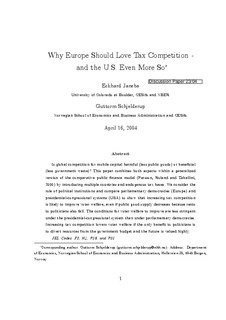| dc.contributor.author | Schjelderup, Guttorm | |
| dc.contributor.author | Janeba, Eckhard | |
| dc.date.accessioned | 2006-08-03T06:42:35Z | |
| dc.date.available | 2006-08-03T06:42:35Z | |
| dc.date.issued | 2004-04 | |
| dc.identifier.issn | 0804-6824 | |
| dc.identifier.uri | http://hdl.handle.net/11250/162860 | |
| dc.description.abstract | Is global competition for mobile capital harmful (less public goods) or beneficial
(less government waste)? This paper combines both aspects within a generalized
version of the comparative public finance model (Persson, Roland and Tabellini,
2000) by introducing multiple countries and endogenous tax bases. We consider the
role of political institutions and compare parliamentary democracies (Europe) and
presidential-congressional systems (USA) to show that increasing tax competition
is likely to improve voter welfare, even if public good supply decreases because rents
to politicians also fall. The conditions for voter welfare to improve are less stringent
under the presidential-congressional system than under parliamentary democracies.
Increasing tax competition lowers voter welfare if the only benefit to politicians is
to divert resources from the government budget and the future is valued highly. | en |
| dc.format.extent | 392504 bytes | |
| dc.format.mimetype | application/pdf | |
| dc.language.iso | eng | en |
| dc.publisher | Norwegian School of Economics and Business Administration. Department of Economics | en |
| dc.relation.ispartofseries | Discussion paper | en |
| dc.relation.ispartofseries | 2004:23 | en |
| dc.title | Why Europe should love tax competition - and the U.S. even more so | en |
| dc.type | Working paper | en |
